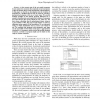Free Online Productivity Tools
i2Speak
i2Symbol
i2OCR
iTex2Img
iWeb2Print
iWeb2Shot
i2Type
iPdf2Split
iPdf2Merge
i2Bopomofo
i2Arabic
i2Style
i2Image
i2PDF
iLatex2Rtf
Sci2ools
101
click to vote
CEC
2010
IEEE
2010
IEEE
Evolving programs with parameters and loops
At the current state of the art, genetic programs do not contain two constructs that commonly occur in programs written by humans, that is, loops and functions with parameters. In this paper we describe an investigation into the evolution of programs for a problem that can only be solved by evolving a parameterised program with one or more loops. We provide training examples of the desired program behaviour for a number of problem sizes and require the evolution of a program P(n) that will give the correct output for any value of n. We have chosen a problem, that of reproducing a binary string to a given number of bits, that can be made harder or easier by adjusting various aspects of the formulation. We are interested seeing in which formulations lead to success and which do not. We conclude that programs with parameters and loops can be successfully evolved if the search space is appropriately restricted by (1) grammars which restrict the possible program structures, (2) limits on pr...
Related Content
| Added | 08 Nov 2010 |
| Updated | 08 Nov 2010 |
| Type | Conference |
| Year | 2010 |
| Where | CEC |
| Authors | Gayan Wijesinghe, Victor Ciesielski |
Comments (0)

